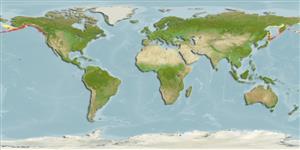>
Perciformes/Cottoidei (Sculpins) >
Agonidae (Poachers) > Anoplagoninae
Etymology: Anoplagonus: Greek, ana = up + Greek, oplon = shield + Greek, gone = birth, generation (Ref. 45335).
More on author: Günther.
Environment: milieu / climate zone / depth range / distribution range
Écologie
marin démersal; profondeur 8 - 102 m (Ref. 2850). Temperate; - 39°N
North Pacific: Bering Sea to Point Arena, northern California, USA. Korean records may be based on a different species (Ref. 27436).
Taille / Poids / Âge
Maturity: Lm ? range ? - ? cm
Max length : 15.0 cm TL mâle / non sexé; (Ref. 2850)
Description synthétique
Clés d'identification | Morphologie | Morphométrie
Épines dorsales (Total) : 0; Rayons mous dorsaux (Total) : 5 - 6; Épines anales: 0; Rayons mous anaux: 4 - 5. Dorsal fin small; caudal well rounded; anal small, under dorsal; pectorals with fleshy rays, the last 3 with ends free from membrane (Ref. 6885). Brown dorsally, brownish gray below; darker band from snout to base of pectoral; vertical dark bars on pectoral and oblique bars on dorsal fin formed by mottling, minute spots on anal, faint dark bars across body; caudal fin dark with light patches dorsal and ventral (Ref. 6885).
Often found among rocks (Ref. 2850). Usually caught by shrimp trawlers (Ref. 4925).
Life cycle and mating behavior
Maturities | Reproduction | Spawnings | Egg(s) | Fecundities | Larves
Eschmeyer, W.N., E.S. Herald and H. Hammann, 1983. A field guide to Pacific coast fishes of North America. Boston (MA, USA): Houghton Mifflin Company. xii+336 p. (Ref. 2850)
Statut dans la liste rouge de l'IUCN (Ref. 130435)
Menace pour l'homme
Harmless
Utilisations par l'homme
Outils
Articles particuliers
Télécharger en XML
Sources Internet
Estimates based on models
Preferred temperature (Ref.
123201): 3.4 - 10.1, mean 6.7 °C (based on 240 cells).
Phylogenetic diversity index (Ref.
82804): PD
50 = 0.7500 [Uniqueness, from 0.5 = low to 2.0 = high].
Bayesian length-weight: a=0.00347 (0.00133 - 0.00903), b=3.12 (2.89 - 3.35), in cm total length, based on LWR estimates for this (Sub)family-body shape (Ref.
93245).
Niveau trophique (Ref.
69278): 3.3 ±0.1 se; based on size and trophs of closest relatives
Résilience (Ref.
120179): Haut, temps minimum de doublement de population inférieur à 15 mois (Preliminary K or Fecundity.).
Fishing Vulnerability (Ref.
59153): Low vulnerability (10 of 100).
